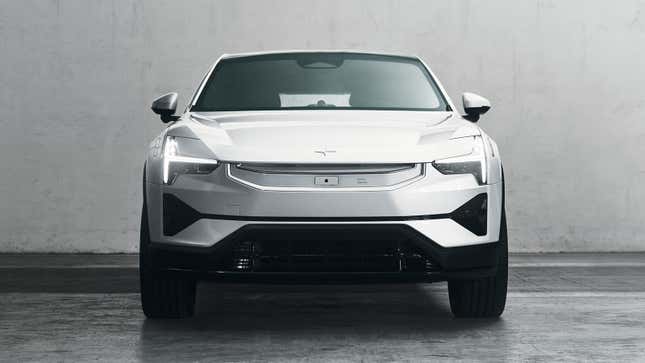Is the Polestar 2 an SUV? I’m personally not sure, but I can say for certain that the Polestar 3, unveiled in full on Wednesday afternoon, definitely looks like an SUV. The manufacturer calls it an SUV, and I think it’s fair to say anyone on the street would describe it similarly. This is a good thing for Polestar, because SUVs happen to be quite popular, you may have noticed.
We’ve seen glimpses of the Polestar 3 on several occasions up until now. One such teaser accompanied a claim by the Volvo spinoff back in June that the electric SUV would provide up to 372 miles of range on a single charge. Polestar is echoing that today although, predictably, that data was collected based on the European WLTP testing cycle, which tends to deliver slightly more optimistic range estimations compared to the way the EPA does its math. As such, the U.S.-bound Polestar 3 claims only 300 miles before needing to juice back up again. First deliveries are expected in the middle of next year, and the SUV will start at $83,900.

Let’s focus on the price first, and what you get for it. The Polestar 2 by comparison begins at just $48,400, which makes for quite a considerable gap within the lineup. The standard dual-motor Polestar 3 offers 482 horsepower and 619 lb-ft of torque. That’s without the Performance Pack, which boosts those figures to 509 hp and 671 lb-ft, respectively, in exchange for a range penalty of 30 miles and a price hike of $6,000. Both deliver power with a rear bias, routed through an electric torque-vectoring, dual-clutch diff similar to what was introduced on the Polestar 1.
Being a Polestar — which is to say an electric Volvo — safety has been a priority in the 3's design. The press release rattles off a bevy of driver-assist tech, from usuals like blind-spot monitoring and forward collision warning, to cameras capable of recognizing distracted drivers, and even motion-aware sub-millimeter radar that will sound the alarm bells if you’ve unknowingly left a living thing in the cabin. In fact, under such circumstances, the car won’t even let you lock the doors.

The infotainment software is provided by Google, via the Android Automotive OS running atop Qualcomm Snapdragon hardware. The SUV’s many external sensors will send their inputs to an Nvidia Drive system-on-chip to crunch numbers, for semi-autonomous driving.
All of this is wrapped in a frame that looks nice, if unremarkable — the way all Volvos and Polestars have in recent years. The company knows how to design cars without conventional grilles and still make them look good. The deep “aero wing” at the leading edge of the hood is functional, and key to achieving a respectable drag coefficient of 0.29 Cd.

Meanwhile, the rear widens the corporate light signature into more of a conventional, horizontal heckblende, which is the way the whole industry’s going now. My one gripe with the Polestar 3's exterior is that seeing out of that greenhouse and past the thick C-pillar looks to be an exercise in futility. Then again, as a new car (and EV, no less) in 2022, this is hardly the only product guilty of such a crime.

Inside, the Polestar 3 is really just about the display — a 14.5-inch, touch-sensitive tablet affixed to the dashboard, floating incongruously above a minimalist, barren ground. The details and trim are nice as you’d expect, with slate-colored wood giving those gold accents, ornate Bowers & Wilkins speaker drivers and jewel-like media dial a benign surface to leap off of. Everything looks very upscale but also very cold, and continues Polestar’s inexplicable fixation on ensconcing its passengers in concrete.

And that’s the Polestar 3. Early examples will not be built Stateside, instead arriving to all markets from Volvo’s facility in Chengdu, China. Eventually — the company estimates by mid-2024 — U.S.-bound Polestar 3s will undergo final assembly at the firm’s Ridgeville, South Carolina plant. Even once the made-in-America requirement is satisfied, the Polestar 3 will start slightly too high to qualify for the Inflation Reduction Act’s $7,500 credit under its current pricing. For an SUV, truck or van to get the benefit, it must cost no more than $80,000 as the law stands.